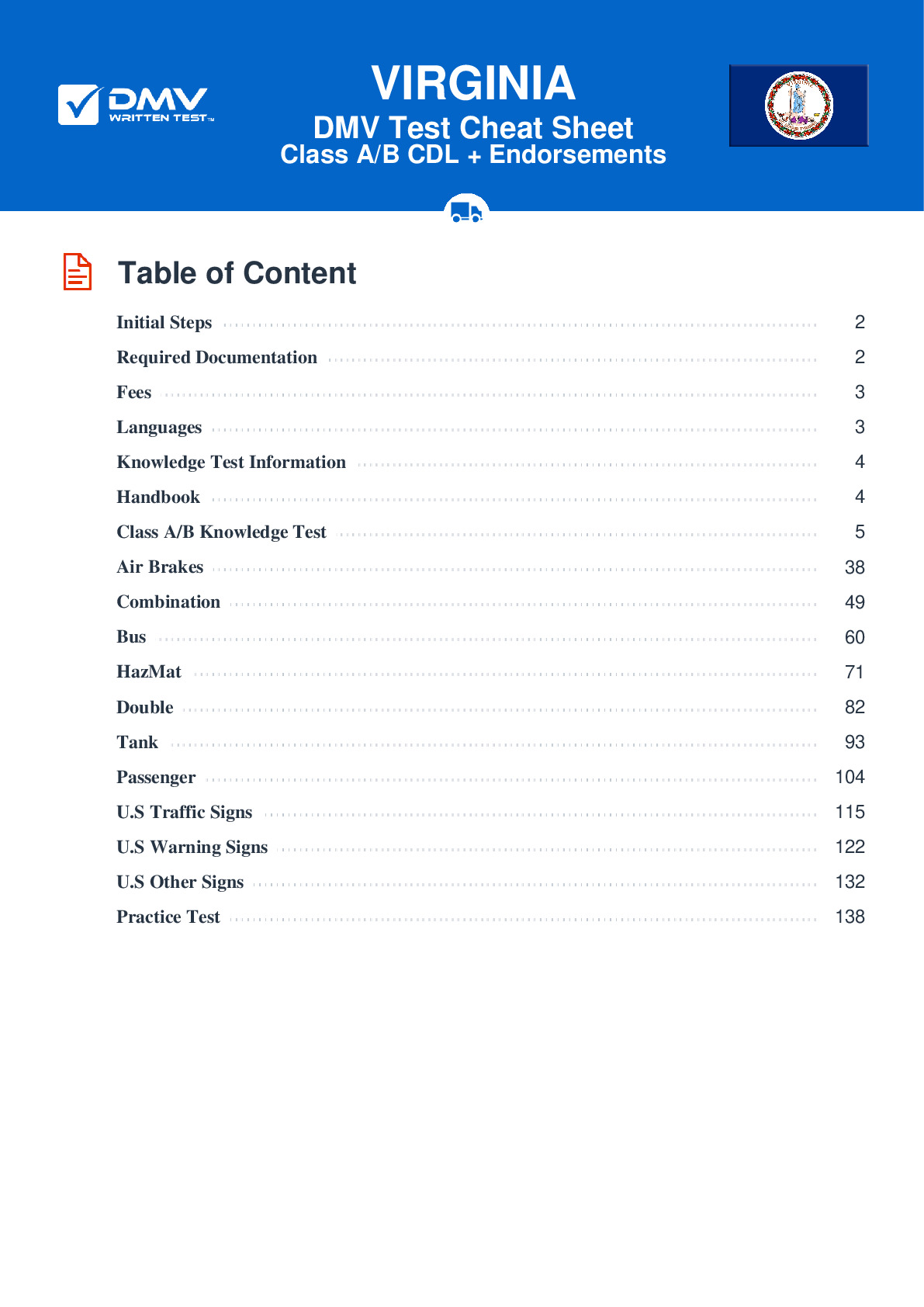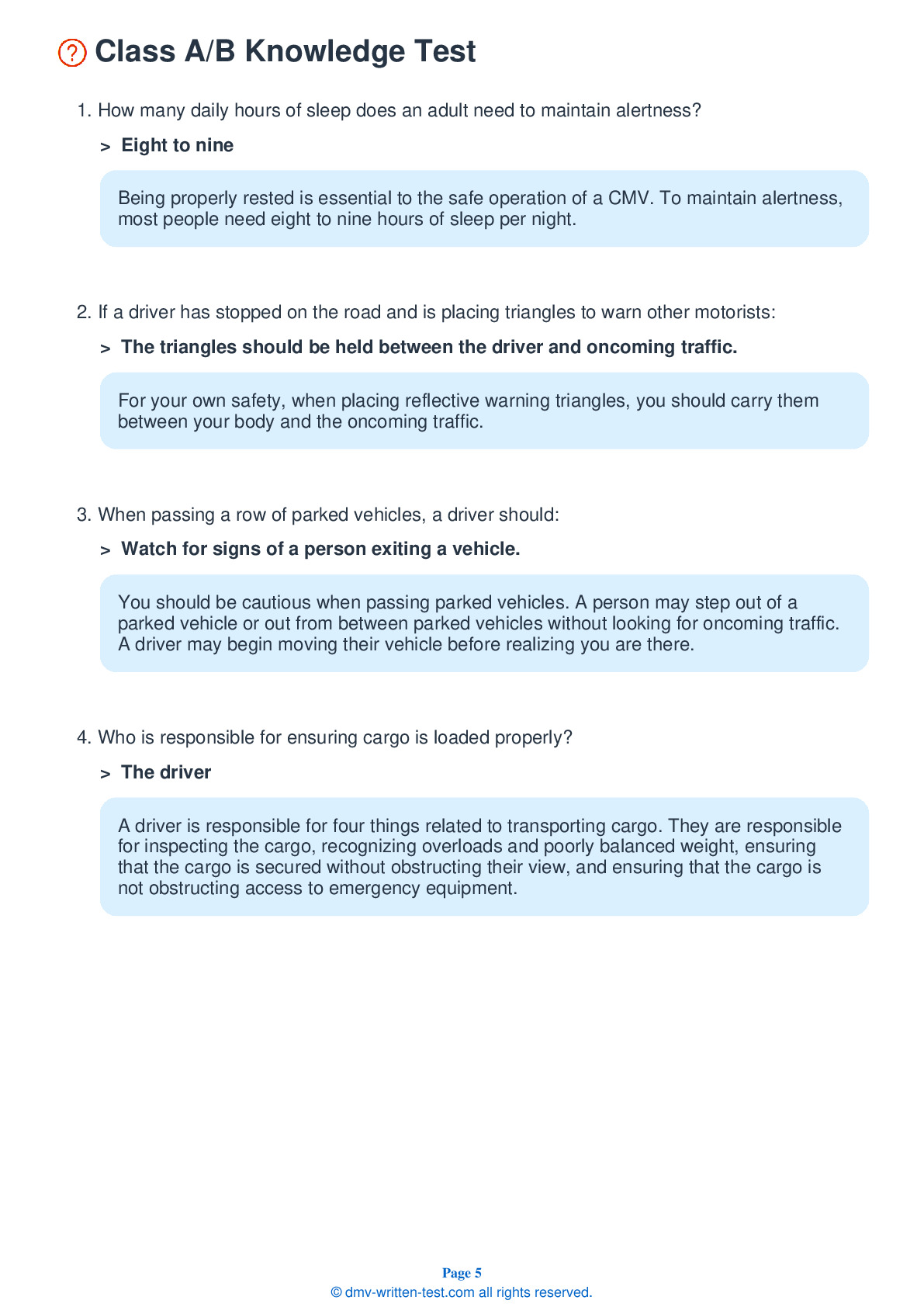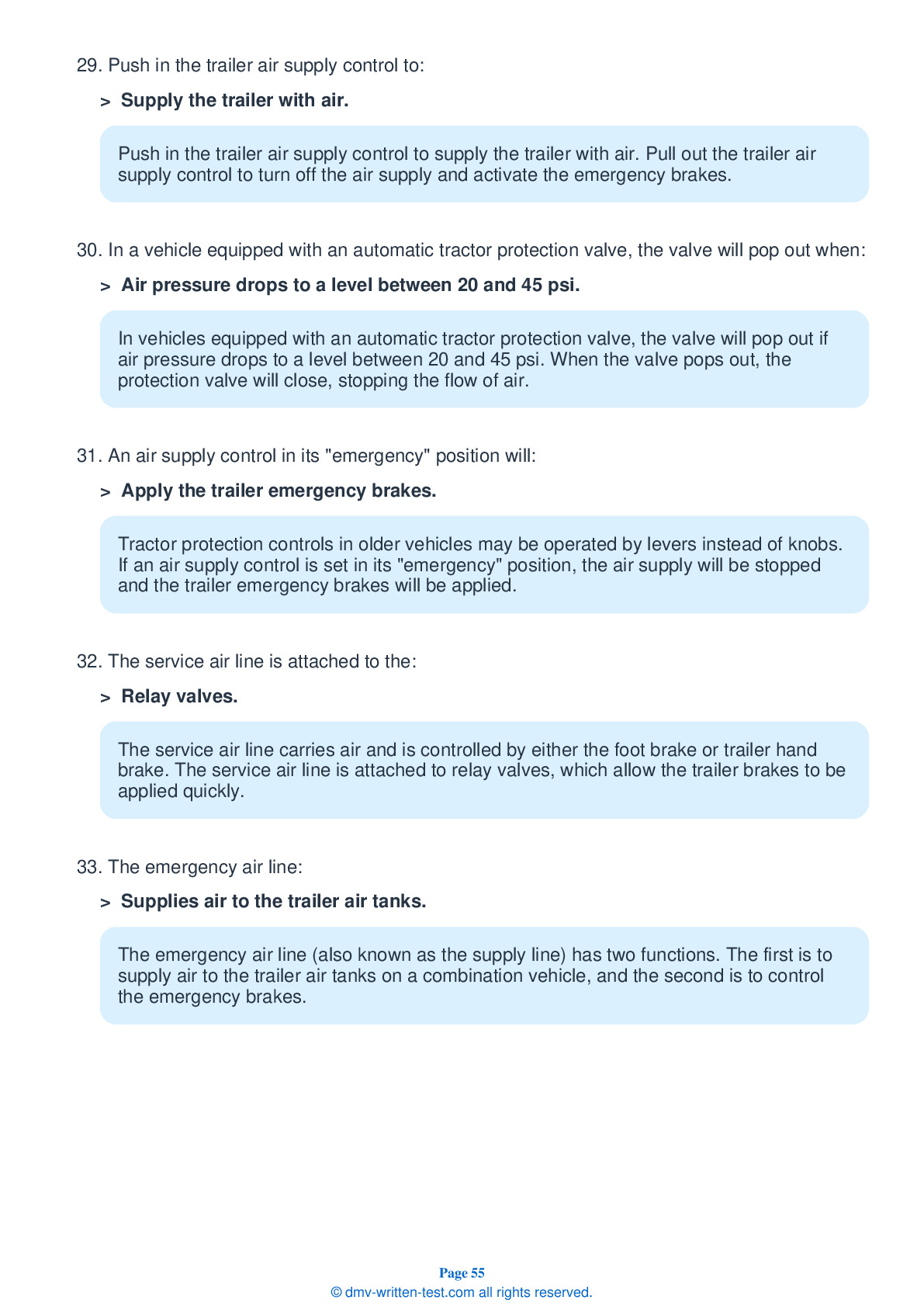Knowledge Test Class A
This license is required for driving any legal combination of vehicles, with a gross combination weight rating of 26,001 pounds or more, provided the GVWR of a trailer exceeds 10,000 pounds. To receive this license, applicants must pass a 50-question test. Test questions come from the Virginia Commercial Driver License Manual. To pass, applicants must answer 40 questions correctly. Each question has three possible answer choices. Questions come from chapters covering: Introduction, Driving Safely, Transporting Cargo Safely, Air Brakes (if applicable), Combination Vehicles, Pre-Trip Vehicle Inspection Test, Basic Vehicle Control Skills Test and On-Road Driving. Endorsements that may be used with a Class A CDL are: Hazardous materials, Tank, Passenger, Doubles/Triples, HazMat, Tank, Air Brakes and School bus.
29. ____ is a thin layer of ice that forms on road surfaces.
Black ice is a thin layer of ice that is clear enough for the road surface to be seen through it. A road covered in black ice may look like it is merely wet instead of icy. Always be on the lookout for black ice if a road surface looks wet and temperatures are around the freezing mark.
30. When passing another vehicle, you should:
Whenever you pass another driver, bicyclist, or pedestrian, you should assume as a precaution that they do not see you.
31. Within 10 minutes of stopping on the side of the road, you must:
If you must stop on the side of the road, you must place the appropriate emergency warning devices within 10 minutes of stopping.
32. A driver should:
Always signal before turning or changing lanes to ensure that other drivers are aware of your intentions.
33. Exhaust system parts should:
It is essential that exhaust system parts are not leaking or otherwise broken. A faulty exhaust system can let poisonous fumes into the cab or sleeper berth.
34. Before a trip, you should make sure that:
When checking your vehicle's pedals during a pre-trip inspection, you should ensure that there is nothing under or around the pedals that will obstruct their use. Make sure the pedals are in proper working condition and that the surfaces of the pedals are grooved, if applicable.
35. Why do large vehicles use air brakes?
If used and maintained properly, air brakes are a safe and effective way to stop large, heavy vehicles.
Frequently Asked Questions
Here are the steps to obtain a Class A CDL license in Virginia:
1. Obtain a Virginia Commercial Learner's Permit (CLP): To obtain a CLP, you must pass a series of written tests related to commercial driving and safety regulations. You must also hold a valid Virginia driver's license and be at least 18 years old.
2. Practice driving and gain experience: You must practice driving with your CLP for at least 14 days before you can take the road test.
3. Schedule a road test: Once you have gained enough experience with your CLP, you can schedule a road test through the Virginia Department of Motor Vehicles (DMV). The road test will include a pre-trip inspection, basic control skills test, and on-road driving test.
4. Pass the road test: On the day of your road test, you must demonstrate your ability to operate a Class A vehicle safely and effectively. If you pass all three parts of the test, you will be issued a Class A CDL.
5. Complete additional endorsements: Depending on the type of vehicle or cargo you will be transporting, you may need to obtain additional endorsements such as hazmat or double/triple trailers.
6. Maintain your CDL: To keep your Class A CDL license valid, you must keep it current by renewing it every five years and complying with any other state or federal regulations related to commercial driving.
1. Tractor-trailers: These are large trucks that consist of a tractor unit and one or more trailers.
2. Tanker trucks: These are trucks that transport liquids or gases in specialized tanks.
3. Livestock carriers: These are trailers designed to transport live animals.
4. Flatbed trucks: These are trucks with an open bed used to transport oversized or heavy cargo.
5. Logging trucks: These are trucks used to haul logs from forests to sawmills.
6. Double and triple trailers: These are combinations of two or three trailers attached to a single tractor unit.
It's important to note that in addition to the Class A CDL license, you may need additional endorsements to operate certain types of vehicles or to transport certain types of cargo.
1. Be at least 18 years old: You must be at least 18 years old to operate a commercial vehicle within the state of Virginia. However, you must be at least 21 years old to cross state lines or transport hazardous materials.
2. Hold a valid Virginia driver's license: You must have a valid Virginia driver's license to apply for a CDL.
3. Obtain a Commercial Learner's Permit (CLP): To obtain a CLP, you must pass a series of written tests related to commercial driving and safety regulations. You must also hold a valid Virginia driver's license and be at least 18 years old.
4. Pass a medical exam: You must pass a medical exam administered by a certified medical examiner to ensure that you are physically fit to operate a commercial vehicle.
5. Provide proof of residency and citizenship: You must provide proof of your residency in Virginia and your U.S. citizenship or legal presence in the country.
6. Provide your driving record: You must provide your driving record from all states where you have held a driver's license in the past three years.
7. Pass the CDL skills test: You must pass the CDL skills test, which includes a pre-trip inspection, basic control skills test, and on-road driving test.
8. Pay the required fees: You must pay the required fees for obtaining your CDL license and any endorsements that you may need.
It's important to note that if you have any prior convictions for certain offenses, such as DUI or reckless driving, your ability to obtain a CDL may be affected. Additionally, additional requirements may apply depending on the type of vehicle or cargo you will be transporting with your Class A CDL license.
- Operate a commercial vehicle outside of Virginia
- Transport hazardous materials
- Operate a vehicle with double or triple trailers
- Drive a passenger bus or school bus
If you are between the ages of 18 and 21 and want to obtain a Class A CDL license, you must also hold a valid Commercial Learner's Permit (CLP) for at least 14 days before taking the skills test. Once you turn 21 years old, these restrictions will no longer apply and you will be able to operate a commercial vehicle outside of Virginia, transport hazardous materials, and drive vehicles with double or triple trailers.
1. T - Double/Triple Trailers: This endorsement is required if you will be driving a vehicle with two or three trailers.
2. P - Passenger: This endorsement is required if you will be transporting passengers, such as driving a bus.
3. N - Tank Vehicles: This endorsement is required if you will be driving a vehicle that carries liquid or gas in bulk containers.
4. H - Hazardous Materials: This endorsement is required if you will be transporting hazardous materials.
To obtain an endorsement, you must pass a written test specific to the type of endorsement you are seeking. You may also need to pass additional background checks and meet certain age requirements. It's important to note that some endorsements may require additional training or certifications beyond the written test.
1. Pre-trip Inspection: In this part of the test, you will be required to demonstrate your ability to inspect the vehicle before operating it. You will be asked to identify and explain the function of various parts of the vehicle, such as the brakes, steering, suspension, and lights.
2. Basic Vehicle Control: In this part of the test, you will be required to demonstrate your ability to control the vehicle in various situations, such as backing up, turning, and parking. You will also be asked to demonstrate your ability to couple and uncouple the trailer from the tractor.
3. On-road Driving: In this part of the test, you will be required to demonstrate your ability to safely operate the vehicle on public roads. You will be evaluated on your ability to follow traffic laws, maintain control of the vehicle, and perform maneuvers such as lane changes, turns, and merging.
It's important to note that you must pass each part of the skills test in order to obtain your Class A CDL license. Additionally, you must provide a vehicle that meets certain requirements for the skills test. The specific requirements for the vehicle can vary depending on the type of vehicle you are testing with.
1. Air Brake Restriction: If you take the skills test in a vehicle without air brakes, you will receive an "L" restriction on your license, which means you are only allowed to drive vehicles without air brakes.
2. Manual Transmission Restriction: If you take the skills test in a vehicle with an automatic transmission, you will receive an "A" restriction on your license, which means you are only allowed to drive vehicles with automatic transmissions.
3. Hazmat Endorsement: If you have a hazmat endorsement on your license, there may be certain restrictions regarding where and when you can transport hazardous materials.
4. Passenger Endorsement: If you have a passenger endorsement on your license, there may be certain restrictions regarding the number of passengers you are allowed to transport and the type of vehicle you can operate.
It's important to note that these restrictions can vary depending on your individual situation and the type of vehicle or cargo you will be transporting. Be sure to check with the Virginia Department of Motor Vehicles for specific details and requirements.
To request accommodations, you will need to contact the DMV's Special Services Division at least 30 days before your scheduled test date. You will need to provide documentation of your disability and explain the specific accommodations you need to take the test. Some examples of accommodations that may be provided include extra time to complete the test, a separate testing room, or assistive technology.
The DMV will review your request and determine if the requested accommodations are reasonable and appropriate. If approved, they will make arrangements for the accommodations to be provided on the day of your test. It's important to note that accommodations are not guaranteed and may depend on the specific nature of your disability and the resources available at the testing location.
It's important to note that you are allowed a limited number of attempts to pass the written test before you are required to take additional steps. If you fail the test three times, you will be required to complete a Virginia DMV-approved commercial driver training program before you are allowed to take the written test again.
If you do not pass the written test on your first attempt, the DMV will provide you with a summary of your results and identify areas where you may need additional study or preparation. This can help you focus your efforts and improve your chances of passing on your next attempt.




